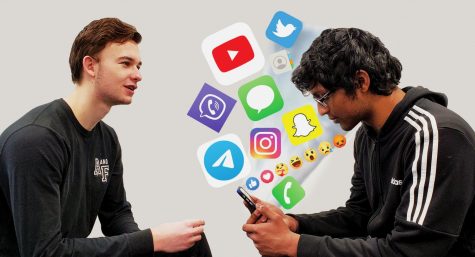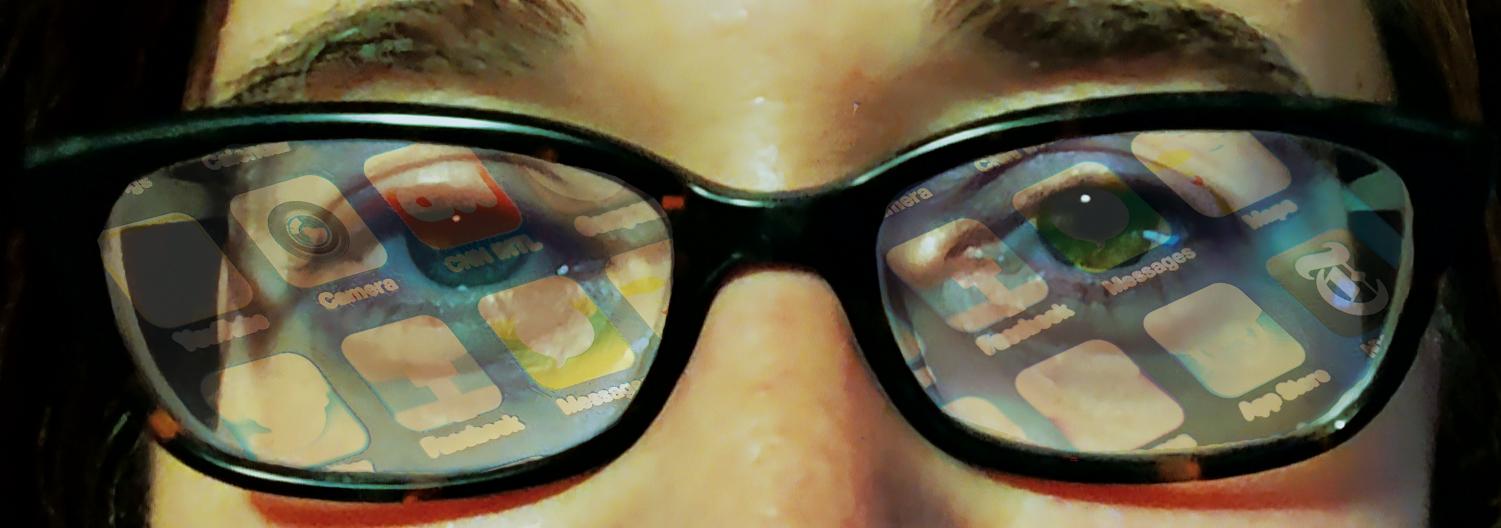Stuck to screens
Dependence on technology influences teenagers’ behaviors and communication
March 21, 2022
Whether pocket-sized or as large as a countertop, screens drive teenagers’ technology-obsessed world. In LZ, the majority of students say they spend ten to 12 hours on technology each day in total, according to a February Bear Facts Student Media survey of 232 students.
While technology has made widespread communication easier and more efficient, according to George McNalis, social studies teacher, technology is “creating an actual disconnect between true interpersonal communication and relationships” because people are increasingly more attentive to technology.
“It used to be that [teachers] wanted to make sure [they] took the lesson all the way out to the end of the class because it would get so loud because kids [would] start talking to each other,” McNalis said. “Now, if there’s free time at the end of a lesson, it gets weirdly quiet because everybody just takes out their phone and goes on the phone. That’s also the case with adults, it’s not just kids. We are just so much more content looking at our phones.”
And students agree. In a February Bear Facts Student Media survey, 92.6% of 232 students report technology has a “big” or “very big influence” on their daily lives, which may be an indication of a dependence on technology.
“I think [people] are becoming more reliant on [technology], but society has always become more reliant on technology; that’s just the way society goes,” McNalis said. “Things are going to be made more efficient, information will be made more available, which are good things. At the same time, I think as we look at social interactions, maybe that’ll get worse.”
Impact on humanity
Ryan Siegel, self-described technology addicted senior, agrees, saying while it is easy to communicate over technology, it is “easier to say things you don’t necessarily want to say.”
“Since it takes so little effort [to communicate over technology], you just quickly type [an email or text] out and then send it. You don’t have to think about it, and then if it hurts someone, it hurts them and can’t really take it back,” Siegel said. “You don’t mean to hurt someone, but then you do, so you have an inability to actually express emotion [through technology].”
Aside from the difficulty to express emotion electronically, Siegel also says that teenagers are “so enveloped in [technology] that we can’t really see life through our own eyes,” which keeps them from “appreciating life the way that it should be.”
“I think [technology] kind of worsens our ability to actually be human. It’s necessary for the continuation of society, but it ruins the human aspect,” Siegel said. “For kids, our whole schooling – it’s partly about education, but also mostly about building social skills – we’re relying so much on technology that it kind of just worsens that ability [to be human].”
In fact, Siegel says he thinks having access to technology may ruin interpersonal communication because “it makes us numb.”
“We text LOL or the laughing emoji, but we’re literally just sitting on our phone, and maybe we smirk, but nothing comes out. We don’t know how to actually react, and [technology] just ruins communication because so much of it isn’t just what you say, it’s how you react, your emotion, and what is behind the words that makes it so vital,” Siegel said. “For the most part, technology is going to be something that ruins socializing and being a person.”

Despite its negative impact on communication, Nina Kothari, school psychologist says technology does have positive effects nonetheless.
“I think it’s a great thing to be able to stay connected, especially thinking about the pandemic, when we weren’t necessarily able to interact with each other in person for a while,” Kothari said. “It would have been even harder for us to work through the pandemic if we didn’t have access to technology tools to keep us connected. Specifically with some students that I work with who may lack connection in general, having the ability to stay connected to the one or two close people in their life was super important to them.”
Access to technology also benefits the educational setting, according to Kothari.
“I think that technology is so amazing, especially within the school setting, for both students and staff. Just thinking about where I started when I was in high school, and now what students are able to do with technology, there’s been so many improvements and changes,” Kothari said. “The fact that students can access their education completely through technology, it becomes a great tool to access so many different aspects of education, [but] obviously, there are some limitations and distractions involved as well.”
While technology increases students’ ability to communicate, according to Kothari, communication can also serve as a distraction.
“With the students that I work with, the majority of students have their own cell phones, so whether it is texting, Snapchatting, or any form of social media, staying connected — which is a positive thing — can be a distraction during the school day,” Kothari said. “The other piece of distractions are other applications that interest students. There are certain games, whether it’s on their phones or video games, that some of my students have specifically reported being big distractors for them; they’d much rather engage in those games than do their homework or chores, so it can cause delaying or completely eliminating their ability to get their work done.”
Impact on behavior
Students admit to noticing this, too. For example, Maximm Mironchik, freshman, says that because technology is another avenue for teenagers to communicate with each other, “a lot of people seem to be glued to it,” which isolates them from having in person interactions.
“[Teenagers] develop online communicating skills, but at the same time, they’re always wanting to be on their phone, so it limits real life interactions. They want to communicate with their friends online, or look at stuff they like, like sports or fashion, so they’re always going to be focused on [technology],” Mironchik said. “It tends to limit [teenagers’] education because often they’re using [technology] for something that doesn’t really benefit their future.”
Another disadvantage teenagers face with increased technology use, according to Mironchik, are personality changes, including irritability, according to the US National Library of Medicine.
“Since [teenagers are] usually on technology, they start to act in a more passive aggressive way because they’re always isolated on their phones,” Mironchik said. “They’re playing some sort of game, like Clash Royale or Clash of Clans, so they’re not really focused much on other stuff; it’s like they value their phone more than anything, and if it goes away, they just start to get really angry.”
In fact, 78.4% of students report looking to their phones for entertainment purposes, according to the February Bear Facts Student Media survey of 232 students. While this number may reflect that “technology can be addicting,” Kothari says she feels “uncomfortable using [the word ‘addiction’] because I would never diagnose someone as addicted [to technology].”
“Depending on what you’re doing that involves technology, it may give you that same high that other addictive behaviors can provide. For example, people who like to gamble get a high from winning, whereas maybe some kids who play a video game and try to get to the next level, they get a high every time that they get to that level,” Kothari said. “If an activity causes a situation where if it was removed from your life you couldn’t function without it, that could be considered addicting. If it was hard for you to move forward with your life without having access to technology or access to an aspect of technology — it’s not really technology in general, I think it is specific things, like social media — that would maybe be considered an addiction.”
Siegel also says he believes that teenagers have an addiction to technology in the sense of “a dependency and can’t live without it” situation, which everyone has because “technology makes everything in our life possible.”
“[Technology] makes it so that we can communicate, get to work, get to school, do school, whatever it may be. It’s available and we’re dependent on that, but then we always will be, I think, until the downfall of society,” Siegel said. “Most hours of the day, kids are on their phones. When hanging out in person, most people are still on their phones; there’s not much time that kids aren’t on their phones because they need that constant stimulation.”
Impact on boredom
This addiction to technology affects how people respond to boredom, according to McNalis.
“Anytime we’re even slightly bored, we immediately go to our phones, and I think that keeps us from communicating with other people, and it keeps us from just talking with the person next to us because now we have something to occupy us,” McNalis said. “Because we never really get bored, we’re also just less likely to do a lot of things because the moment we become a little bored, we look at our phones. That’s adults as well, and that’s me as much as anybody. The moment we have that time, we just take out our phone and we just scroll through something useless.”
And it is not only boredom that technology has affected, McNalis said.
“One little thing I’ve seen is the idea of making a plan in advance and having to stick with it is gone. It used to be, ‘Let’s hang out this afternoon or this evening,’ and you said, ‘Okay, pick me up at seven,’ and you just did it; there was no texting back and forth like, ‘Leaving now,’ ‘Okay, I’ll be waiting,’ and all that,” McNalis said. “You planned and you followed through on your plans, whereas I think, even adults, we’ve largely lost that ability and we don’t do that. Because you can communicate instantly, you don’t have to make a lot of future plans; you can figure it out as you go, which at times is a good thing, but it’s a weird component that we’ve seemingly lost.”
Benefit of “un-plugging”
As a teenager who is “definitely addicted [to technology], no questions asked,” Siegel says he has times “where I disappeared because I don’t go on my phone,” which helps him “appreciate those deep conversations” he has with others.
“I set [technology] down so I’m not constantly being stimulated by it. I’m having discussions with my family, I’m watching TV with them, I’m playing games with them. I’m reading, I’m doing something other than just playing on my phone,” Siegel said. “There’s a world outside of it. Some people don’t necessarily understand and see that, but I think we have to recognize that there are people out there; they’re not just all locked up in their phone. There’s a lot of people who are only on their phone, and I think that there’s a benefit that you have to unplugging and disconnecting from technology. That’s something valuable that everyone should experience and should do.”
